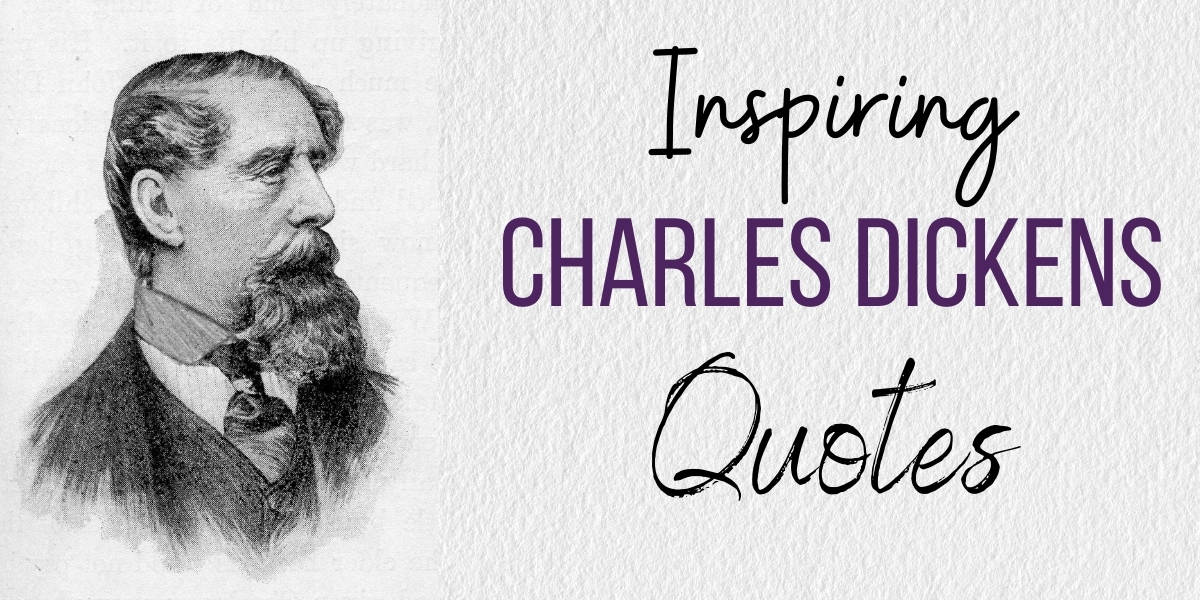Why One-Size-Fits-All Mental Health Care Fails TRD Patients
Mental health care has come a long way in the past few decades, with more
Samuel Griffin
Jul 21, 2025The Skin Treatments That Can Have a Big Impact on Your Self-Esteem
Our skin is one of the first things people notice about us, and it plays
Samuel Griffin
Jul 13, 2025Choosing the Right Substrate for Promotional Printing
When it comes to promotional printing, the quality of the final output depends just as
Samuel Griffin
Jul 4, 2025What Home Improvements Should You Make as You Get Older?
Rather than keeping your home the same as you age, there are a number of
Samuel Griffin
Jun 30, 2025What to Do When Your Business Finances Begin to Kick Off
You might have never raised your hopes that your business could be a success, or
Samuel Griffin
Jun 30, 2025Digital Life, Real Moves: Navigating Transport in a Connected Age
In the hyperconnected world, technology isn’t just shaping how people communicate or shop—it’s fundamentally changing
Samuel Griffin
Jun 23, 2025Verbal Communication
Verbal communication involves an expression of using language in order to share information with others. It could therefore encompass both written and spoken communication. However, many people apply the term to refer to just spoken communications. The Verbal communication is about the words you select, as well as how they are interpreted and heard.
What is Verbal Communication
Verbal communication is the art of presenting your ideas in a verbal format i.e. speaking. Communication skills that are verbal are crucial for business. For weekly meetings or a presentation to the customers the significance of communication through words is unrivalled. People remember the person who can communicate clearly, effectively clearly, confidently and with a flair for the dramatic.
Verbal Communication Meaning
Verbal communication refers to the use of language and words to communicate the message. Examples of verbal communications are conversations, speeches or presentation, or an audio conversation with one another. Verbal communication is an alternative of the nonverbal method of communication in which messages are communicated without words, whether written using symbols or body language.
Communication through words is a soft ability that defines leadership. This is among the main reasons why good communication skills are essential in the business world and at work. It is an integral aspect of establishing relationships with business. Furthermore, effective verbal communication at work can help the business operate more effectively. Because of this, the skills of verbal communication are taught in courses for business professionals.
Non Verbal Communication
Non verbal communication refers to the transmission signal or message using an non verbal medium like eye contact and gestures, facial expressions body language, and posture. It includes the use of social cues, kinesics, distance and physical environments/appearance, of voice and of touch.
Difference Between Verbal and Non verbal Communication
Verbal communication is based on written or oral language, while non verbal communication does not employ any written language of any kind. Verbal communication has only two kinds, whereas non-verbal communication can be classified into many different types, such as audio silent, visual as well as silent. Non verbal communication is hard to comprehend while verbal is easy to comprehend. When communicating verbally, there is less risk of confusion and miscommunication than in non verbal communication, which is transmitted via non-verbal clues. The formality level is lower in non verbal communication, while verbal has a more formal tone.
| Verbal Communication | Non verbal communication |
| Communication of information via words | Information exchange through non-verbal clues |
| Has less of a chance of confusion | High chance of confusion |
| It is easy to grasp | It’s hard to comprehend. |
| It is extremely formal and well-structured. | It is unstructured and informal |
| Two people are not required. is not required | Two persons is required. |

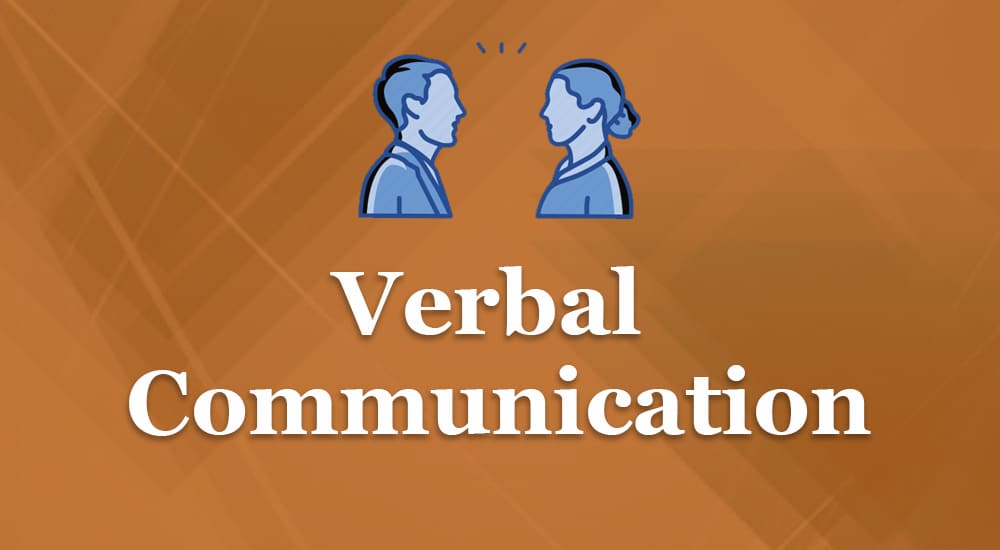
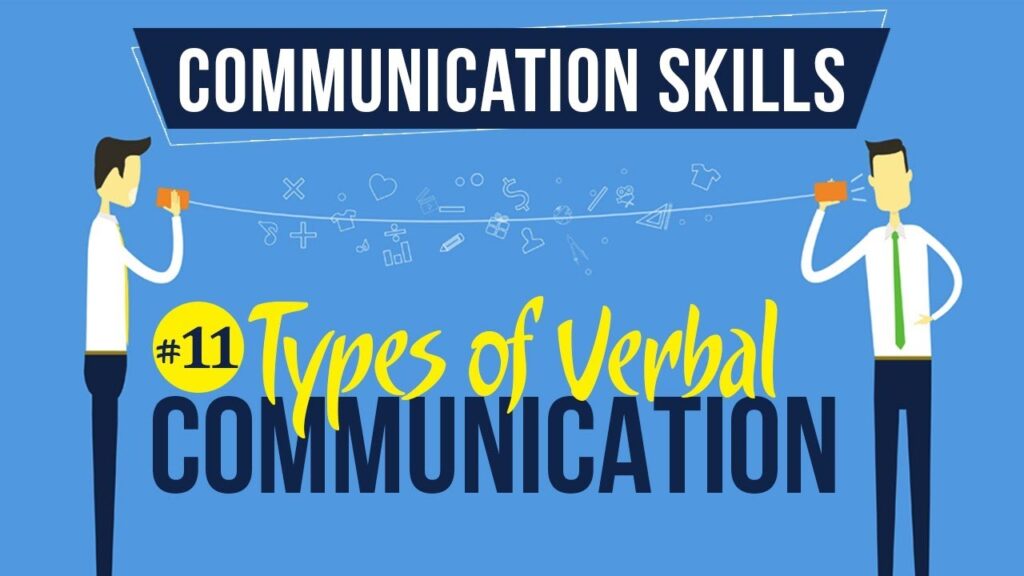
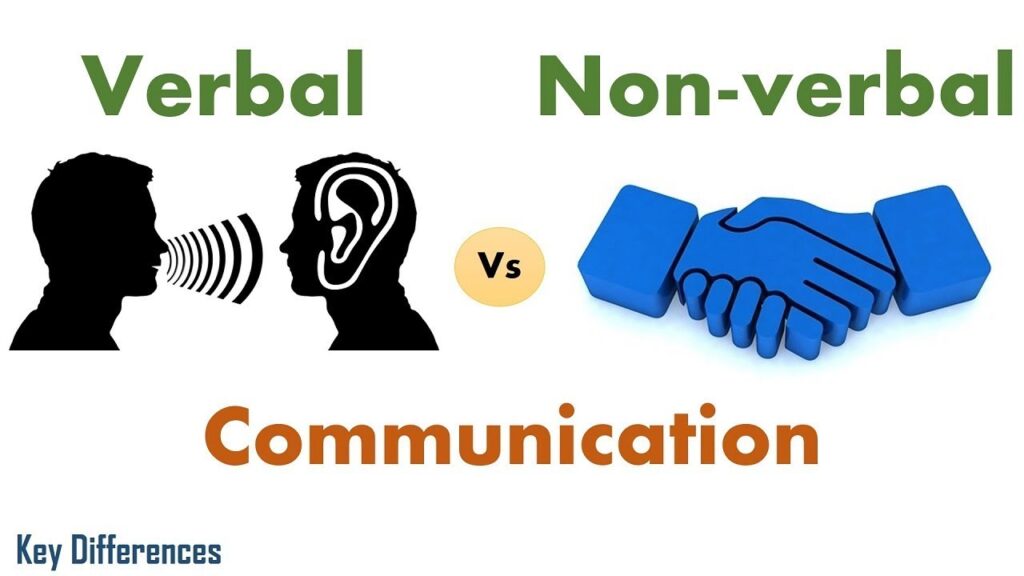
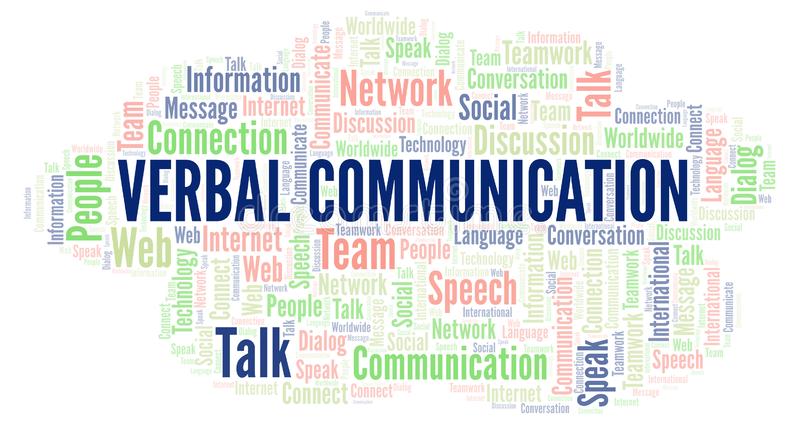
Verbal Communication Vs Nonverbal Communication
There are many ways to communicate with everyone. The two main ways are verbal and non verbal communication.
Verbal Communication
Verbal communication Examples of Written Communication:
- Letters
- Texting
- Emails
- Books
Verbal communication Examples of Oral Communication:
- Face-to-face conversations
- Speech
- Host on a Radio
- Interview
Nonverbal Communication
Examples of Body Language Communication:
- Waving (An indication of “Hello” or “Goodbye” )
- Sign languages
- Head nod (An indication of agreement)
- Finger tapping
- Arms crossed over chest
- Making eye contact
- Handshakes
- Smile
- Hugs
Effectiveness of Verbal communication
The efficacy of spoken communication is determined by the tone used by the speaker, the clarity of voice, the volume body language, speed and also the level of the words spoken. When it comes to verbal communication it is instantaneous because there is the simultaneous transmission and reception of the message from the receiver and sender.
The sender should keep his tone of speech high and easily heard by everyone and should compose the subject matter with the viewers in mind. The sender must constantly be sure to cross-check with the receiver in order to ensure it is received in the exact manner as intended. The Verbal communication can be more prone to mistakes since sometimes the words do not suffice to convey the emotions and feelings of an individual.
Importance of Verbal Communication
1. Verbal communication The flow of ideas and thoughts
Being able to clearly and easily communicate voice with high confidence levels at the team meeting , or an offsite meeting with the director of your company , or with your colleagues and friends increases the flow of ideas and thoughts. The flow of innovative concepts, innovative ideas as well as innovative strategies for promotions and brand new marketing channels Many things are investigated by recognizing the importance of Verbal communication.
2- Ensures job satisfaction
When we look at the relationship between the employer and an employee communicating clearly between these two parties increases the confidence and satisfaction for the employees. Employers must help his employee aware of his strengths and detriments at work to help him up his performance and eliminate his weaknesses and address the issue that arise. This also boosts confidence levels which leads to a rise in efficiency at the workplace.
3- Verbal Communication Breaks cultural differences
Recognizing the importance to Verbal Communication is important for multinational corporations or those that work with international stakeholders and investors. Because a lack of Verbal communication between two individuals of different religious and cultural backgrounds can affect one’s emotions and can be an obstacle to negotiations.
4- Verbal communication Mark of Confidence
If a person is clear and confident how he interacts with people both verbally and non verbally is a sign of confidence. This quality and integrity will allow him to embark on the path to success, glory and fame in every step of the professional and personal lives. Mark of confidence is important aspect of Verbal communication.
Advantages Of Verbal Communication
Communication via words is among the most crucial methods of Verbal communication. The more proficient your communication skills are more easy it will be to build trust and establish long-lasting relationships with others. Here are a few benefits of having a strong voice.
Here the Advantages of Verbal Communication:
- It saves time.
- Also saves money.
- Get feedback quickly.
- Most convenient method.
- The clarity of the method.
- Easy to prepare.
Verbal Communication Disadvantages
Main disadvantage of Verbal communication. The main drawback to spoken communication is the regional differences between the sender as well as the receiver. The reason for this could be that they speak a different dialect and the language differs.
The size of the audience is an obstacle for oral communication since the speaker can only speak to just a few people at one time.
- Regional differences are the biggest obstacle.
- Different dialects and languages are an additional reason for the language barrier.
- A large audience size can also be an issue in terms of communication difficulties.
- The receivers may forget quickly the information they were given.
- Every person isn’t listening in the same way.
Examples of Verbal Communication
The majority of jobs require employees with spoken communication skills. This is why communications skills get top importance in the evaluation of students types used by the majority of the employers.
Employers who are able to convey information with clarity and efficiency are regarded as highly valuable by their employers. People who are able to effectively communicate with other employees have a better probability of succeeding in their job.
Verbal communication Examples mentioned below:
- Communication via oral includes how we communicate to each other using words.
- written communication includes what is written in words.
- Learning to listen includes the way we listen to other people.
- Mediated communications includes the internet for data searching.
- Communication that is non verbal includes body language, confidence, etc.
How to Improve Verbal Communication Skills?
Verbal communication skills that are strong and effective are vital for everyone. They are crucial in our personal and professional lives. Use the tips below to improve your Verbal communication skills at work.
If we communicate clearly and confidently and with a little pause, we’ll be able to gain the respect of others and create an excellent image.
1- Think before speaking
Many people are uncomfortable with the silence. However, pausing before responding to a question can enhance your responses in Verbal communication skills . By taking time to reflect, it helps you make the thoughts you have in mind into a concise sentence. If you are rushed to respond, your stress will be reflected in the way you respond, meaning your words may not be as clear as you intended. Pauses signal contemplation, so your audience gets perception that you took your time in deciding on the most appropriate response prior to speaking.
2. Being precise and clear.
Simplifying your speech can not only make your message easier to comprehend but also allows you to get your key messages across to your audience faster. Before you speak, think about how you can convey your message as concisely and with as little words as you can. When speaking or writing, try not to using long sentences and complicated words or providing irrelevant details. By following these Verbal communication guidelines, you can ensure that your audience understands the most important points of your speech and react in a manner that is appropriate. This ability is particularly useful when you are giving instructions or expectations to your colleagues because your clarity ensures that there’s no confusion.
3. Confidently speaking.
It is essential to have confidence because when you sound as if you do not believe the message you’re putting forth the people around you will also not believe in what you are saying. You must establish that you are credible or have authority. Which will make people feel more confident and more inclined to listen to what you say. There are many methods of demonstrating Verbal communication confidence, such as the manner in which you present yourself during conversations as well as how you speak and the voice you employ.
4- Active listening.
Verbal communication- For active listening to be active listeners, give the person your complete attention so that you do not just hear what they speak, but as well the message they wish to communicate. When you feel that the other person is heard, they are more open to listening to what you have to say.
Verbal communication Effective strategies for active listening are:
- Beware of making judgements or stereotyping other people.
- Take away any distractions like a noisy environment.
- Pay attention to what you hear from the other person instead of contemplating what you would like to say next.
- Make sure to ask questions to clarify your understanding to ensure you comprehend the message or information.
- You must wait until the other party is finished speaking before you respond.
5- Practice your skills is Important in Verbal communication
Once you’ve learned the many ways to improve your speaking skills You must work on these skills. This will not only help you develop these abilities however, it will also aid you in feeling more confident with your ability to speak. Use these Verbal communication strategies as often as you can in your everyday workplace and in your personal interactions to make sure you’re comfortable using them.
Make it a practice to speak on your own the mirror or recording your own speech or presentation. If you are watching yourself, you can observe how you move and then take steps to improve your Verbal communication language.
Verbal Communication Conclusion
Verbal Communication skills are one of the key elements to maintain a productive business relationship. It aids in increasing efficiency, reducing errors and making processes more smooth and more efficient.
Employers with excellent Verbal communication skills can build productive relationships with their suppliers, customers, clients as well as other companies. People from diverse backgrounds should have excellent communication skills as it eliminates barriers that may arise due to cultural or language differences. In the end, efficient communication through words is among the most crucial factors to increase job satisfaction.
Navigating an Accident Near Me: What to Do and How to Stay
Introduction Being involved in an accident near me can harrowing experience, but knowing what to
Samuel Griffin
Feb 16, 2024Unleashing the Power of Elementor Pro: A Comprehensive Review
Introduction to Elementor Pro In the realm of WordPress website design and development, Elementor Pro
Samuel Griffin
Feb 12, 2024Unlocking Business Efficiency with Warehouse Management Systems
Introduction In the ever-evolving landscape of business, staying ahead often involves adopting cutting-edge technologies. For
Samuel Griffin
Jan 9, 2024Windows 11 Reaches 1 Billion Devices Milestone: Microsoft Celebrates Decade of Dominance
In a historic achievement, Microsoft proudly announced that Windows 11 has reached the remarkable milestone
Samuel Griffin
Dec 15, 20234 Effective Strategies to Make Learning Quran a Fun and Easy for
Are you struggling to make Quran learning fun and easy for your child? Look no
Samuel Griffin
Nov 29, 2023Why young boys prefer Kurta over salwar kameez
Step into any clothing store in India and you’ll find a wide array of traditional
Samuel Griffin
Nov 16, 2023What is Agoraphobia and How it is Treated?
In the old days, mental illness or mental health problems often were seen as
Samuel Griffin
Oct 24, 2023How Online Bookings Are Transforming Car Hires In Heathrow
If you travel frequently, you might be familiar with the hassle and frustration that often
Samuel Griffin
Oct 11, 2023Verbal Communication List
Verbal Communication List
- July 2025 (3)
- June 2025 (4)
- April 2025 (1)
- March 2025 (2)
- February 2025 (2)
- January 2025 (1)
- December 2024 (2)
- November 2024 (2)
- October 2024 (5)
- August 2024 (1)
- May 2024 (1)
- April 2024 (1)
- March 2024 (6)
- February 2024 (3)
- January 2024 (1)
- December 2023 (1)
- November 2023 (2)
- October 2023 (2)
- September 2023 (3)
- August 2023 (1)
- July 2023 (3)
- June 2023 (1)
- May 2023 (2)
- April 2023 (1)
- February 2023 (8)
- January 2023 (5)
- December 2022 (2)
- November 2022 (3)
- October 2022 (2)
- September 2022 (10)
- August 2022 (6)
- July 2022 (3)
- June 2022 (3)
- May 2022 (16)
Verbal Communication Profile
Verbal Communication Trending
Verbal Communication Recent
Verbal Communication Popular
Verbal Communication Faqs
Verbal communication is made up of oral and written language. Verbal communication involves the words said while non-verbal communication consists of how the words are spoken. The facial expressions, tone of one’s voice, gestures and body language matter a lot.
1. Intrapersonal Communication (IC): This form of communication is extremely private and restricted to ourselves.
2. Interpersonal Communication (IC): This form of communication takes place between two individuals and is thus a one-on-one conversation.
3. Small Group Communication (SGC): This type of communication can take place only when there are more than two people involved.
4. Public Communication (PC): This type of communication takes place when one individual addresses a large gathering of people.
Verbal communication is used to convey information that we need to let others know of our requirements or share knowledge. Clarification is an essential component of the verbal communication. Communication via verbal means helps to clear the confusion and also provides information that is not clear.
Non verbal communication refers to unspoken ways of expressing meaning, such as gestures, facial expressions, and tone of voice.
Those who communicate well tend to succeed and improve Verbal communication personally. Few Example:
-
Stop talking and start listening
-
Think before you speak
-
Use of concise language
-
Focus on body language
-
Understand your audience
Advantages of Verbal communication are mentioned below:
-
It saves time
-
Feedback quickness
-
Most convenient method
-
Ease of preparation
-
Clarity of message
Verbal communication uses sounds, words, and languages to get your message across, while nonverbal communication uses non-vocal tools like eye movement, body language, and tone.
Effective communication is possible if we are paying focus on whatever the person speaking is speaking and are trying to keep away from all distractions.
Nonverbal is more powerful because it reveals the kind of person we are when compared to verbal. It is stated that actions speak more than words.





















